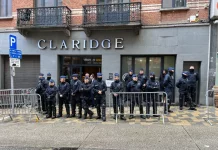Myanmar/Burma’s ousted leader Aung San Suu Kyi was sentenced to two years in prison on 6 December in the first of a series of verdicts on a total of 11 charges which could result in her being imprisoned for life. She was initially sentenced to four years, but this was later reduced by junta chief Min Aung Hlaing.
Ms Suu Kyi was found guilty of of inciting dissent and breaking COVID-19-related rules under a natural disasters law. The 76-year-old former leader has been held at an unknown location ever since the Myanmar army, known as the Tatmadaw, seized power in a coup on 1 February 2021.
Since the coup, the military has overseen widespread lethal and non-lethal attacks on all segments of the population as thousands of citizens have continued to protest the military takeover. Military airstrikes have been particularly widely documented in Chin, Kayah, Karen and Kachin states.
On 5 December five people were killed, dozens were injured, and at least 15 were arrested after security forces used a car to ram into an anti-coup protest in Yangon.
Benedict Rogers, CSW’s Senior Analyst on East Asia and author of three books on Myanmar, said: “CSW condemns the sentencing of Aung San Suu Kyi. While it is important not to forget that the former leader must be held to account for her complicity in violations against Myanmar’s ethnic nationalities during her tenure as State Councillor, this latest development likely precipitates further similar verdicts against her on charges of which she is completely innocent, and which are based on allegations made by a regime who bears even greater responsibility for historic human rights violations in the country. The people of Myanmar have remained unbowed in their calls for the restoration of democracy, even as they face horrific violence at the hands of the military. We echo these calls, and urge the international community to do everything in its power to support the citizens of Myanmar, including by establishing a global arms embargo as a matter of urgency.”










